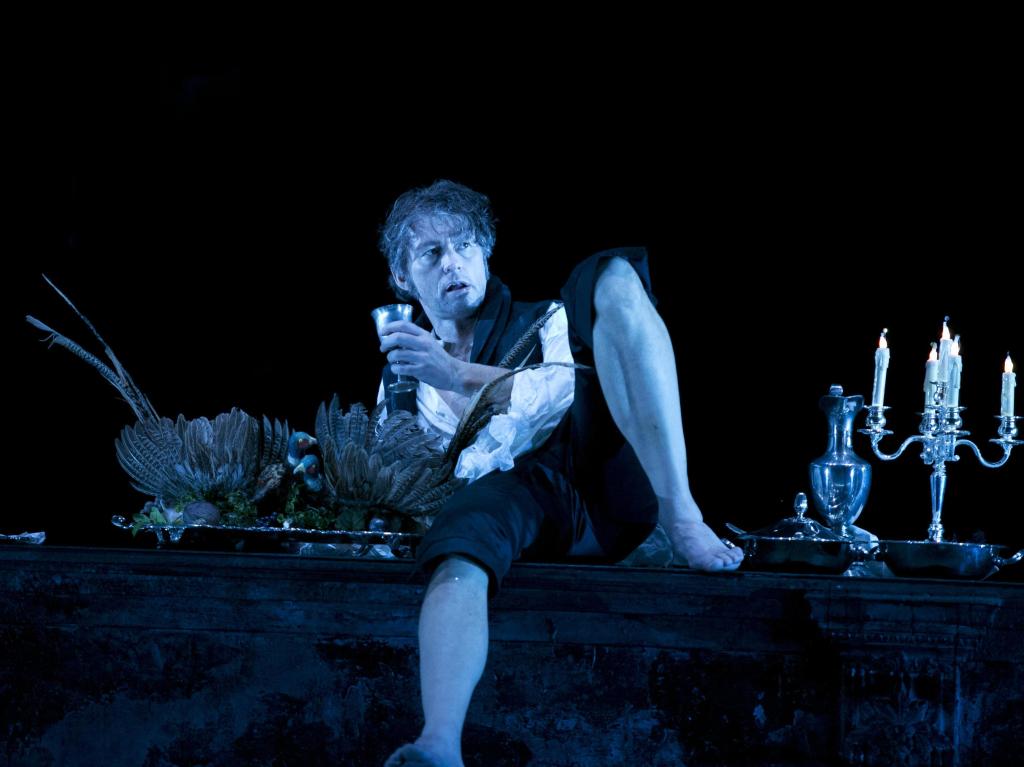Teddy Tahu Rhodes. Image by Lisa Tomasetti.
One of the most memorable moments in Miloš Forman’s film, Amadeus, features the dramatic climax from Don Giovanni. A massive, terrifying ghost breaks into the opera to take the ultimate sinner, Don Juan, to hell. The scene is full of tension and horror, and throughout Mozart’s music swells and strains, rising and falling beneath the booming bass notes of that terrifying ghost.
It’s a scene that is just as thrilling when you see this opera live, especially when Opera Australia’s favourite bass, Jud Arthur, rises from the dead in all the gothic horror glory of David McVicar’s new production.
It’s also a scene that can be difficult to pull off, but this entire production seems to have been built around it. For this reason, however, many of the other scenes in the three-and-a-quarter-hour-long opera are not served quite so well. This is Mozart – full of comic brilliance and energy – but Robert Jones’ set remains grey and forbidding, and the costumes equally colourless, throughout. The giant stone edifice, the graves, the skulls strewn in heaps of refuse, would make the perfect setting for an Edgar Allan Poe story, but often jar in Don Giovanni.
Teddy Tahu Rhodes’ version of the Don is, like the set, disturbingly dark for the most part. He’s a rapist and a murderer – a thoroughly unpleasant guy – but women fall for him constantly. A lot of women. 1003 in Spain alone to be exact, as Shane Lowrencev’s Leporello tells us in one of the lighter moments of this production – a pitch-perfect comic version of the famous Catalogue Aria.
Why an endless stream of women would happily line up to be used and abused by this Don Giovanni isn’t always made clear, but Tahu Rhodes’ extraordinary voice and charismatic stage presence are pretty good reasons nonetheless. When he lets it rip his power is spine tingling, and when he wraps that iron-fisted voice in velvety softness it’s, well, melting.
The three women who melt to various degrees under Tahu Rhodes’ spell certainly prove this Don Juan to have good taste. In the role of Donna Anna, Elvira Fatykhova’s voice is a glorious blend of dark shades and spicy scents; Nicole Carr’s radiance and strength are shown to full effect as Donna Elvira; and Taryn Fiebig as Zerlina gives her usual exquisite mixture of sweet, delicate clarity and fulsome power.
John Longmuir, as Don Ottavio, sings with beautiful colour, but his weak character isn’t quite weak enough to be amusing. Shane Lowrencev’s voice and comedic skills are both supreme, although the latter weren’t let loose nearly often enough. Richard Anderson’s Masetto was vigorous and nicely incensed.
Down in the pit, the orchestra strains to be heard, as ever in the dead spots of the theatre, but under conductor Jonathan Darlington they are superlative, and Mozart shines as bright as ever.
Music and musicians are supreme, but, although we’d been led to believe world-renowned director David McVicar’s production would be one of the highlights of the year, for the most part his gothic staginess drains the show of energy rather than echoing its liveliness.
Rating: 3 ½ stars out of 5Don Giovanni
Opera Australia
Conductor: Jonathan Darlington
Director: David McVicar
Set and Costume Designer: Robert Jones
Lighting Designer: David Finn
Choreographer: Andrew George
Cast: Teddy Tahu Rhodes, Shane Lowrencev, Elvira Fatykhova, Nicole Car (until 16 August), Jaqueline Dark, John Longmuir, Taryn Fiebig, Richard Anderson, Jud Arthur
Joan Sutherland Theatre, Sydney Opera House, Bennelong Point
www.sydneyoperahouse.com
25 July – 30 August





